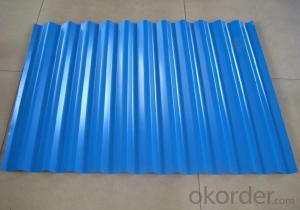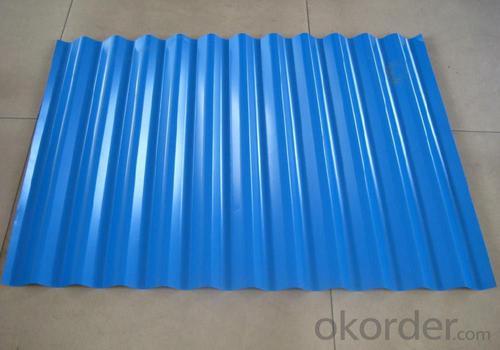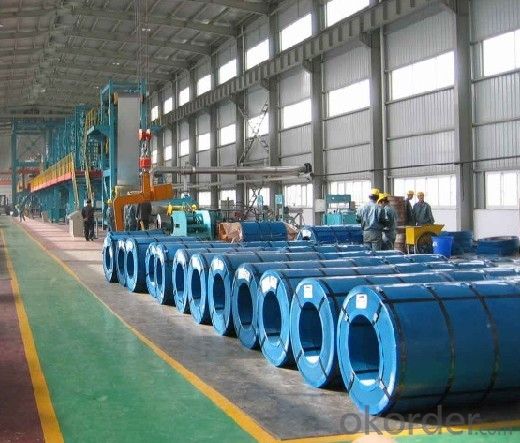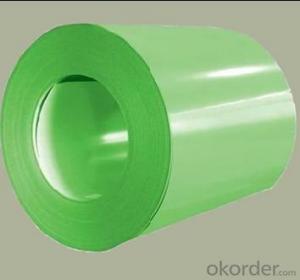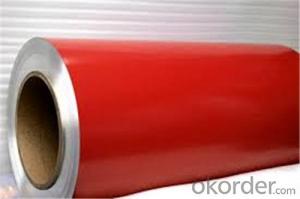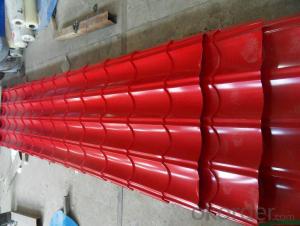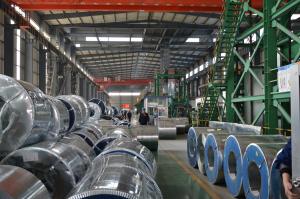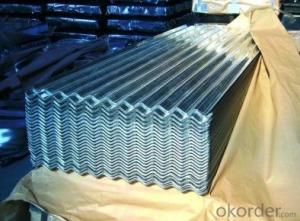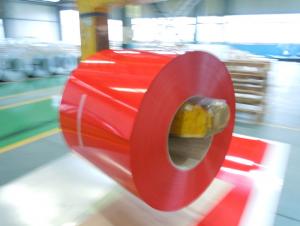color coated galvanized steel coil for making roofing tile
- Loading Port:
- Shanghai
- Payment Terms:
- TT OR LC
- Min Order Qty:
- 25 m.t.
- Supply Capability:
- 30000 m.t./month
OKorder Service Pledge
OKorder Financial Service
You Might Also Like
Specifications
1.Hardness:HRB60-85
2.Grade:ASTMA653,ASTMA792,JIS G3302 SGCC,DX51D-Z
3.Thickness:0.15-1.6mm
4.Width:800-1250mm
5.Z60-Z180
Prepainted Galvanized Steel Coil
TDC52D+Z
Thickness:0.13-8mm
Width:1350mm
Zinc coating and Polyester Coating:By the Buyer
Commodity Name: Prepainted Galvanized Steel Coil Standard: AISI, ASTM, DIN, GB, JIS Grade: TDC52D+Z Thickness 0.13-8.0mm Width:600mm-1350mm Zinc Coating:275g/m2 Polyester Coating Thickness:Top and Back coating thickness depend by Buyer Requirement. Polyester Coating Type:2/2,1/2m,1/2. Polyester Type: Polyester, silicone modified polyester, high durability polyester (HDP), polyvinylidene fluoride (PVDF) Unit Roll Weight:5-20tons Place of Origin Shanghai , China (Mainland) Surface Treatment :Color Coated Manufacture Progress:HRC-CRC-GALVANIZED-COLOR COATED Application : Construction, electrical, transportation, steel plant, composite board plant, steel tile factory Payment & Shipping Terms:T/T ,L/C, and FOB CHINA Minimum Order Quantity: 25Tons Packge Type: Moisture-proof paper inner,Steel outside,Bundle by steel rope. Package in Container : Wood as a foot pad, wire rope reinforcement,PPGI steel coil tied together by steel rope.
Introduce abt ourself: We are one famous factory who place quality first place ,and try provide best service for our buyer . |
- Q: What are the different types of edge treatments for steel coils?
- There are several different types of edge treatments for steel coils, each serving a specific purpose and providing different benefits. 1. Slit Edge: Slit edge is the most common type of edge treatment for steel coils. It is achieved by cutting the coil along its width, resulting in two distinct edges. Slit edges are generally smooth and free from burrs, making them suitable for most applications. 2. Mill Edge: Mill edge is the untreated edge of a steel coil as it comes from the rolling mill. It is characterized by a rough and uneven surface, with visible imperfections such as burrs and irregularities. Mill edges are typically not suitable for direct use and require further processing or trimming to achieve a desired edge quality. 3. Trimmed Edge: Trimmed edge is an edge treatment that involves removing the rough and irregular portions of the mill edge. This process is done through shearing or cutting, resulting in a smoother and more consistent edge. Trimmed edges are commonly used when a clean and uniform appearance is required. 4. Deburred Edge: Deburring is a process that removes any sharp or rough edges from the steel coil. This treatment is essential for applications where safety is a concern, as it eliminates the risk of injury from handling sharp edges. Deburred edges are achieved through grinding or filing and provide a smooth and safe edge for various applications. 5. Rounded Edge: Rounded edge is a type of edge treatment that involves rounding the sharp corners of the steel coil. This treatment is often used to prevent damage to other materials or surfaces during handling or transportation. Rounded edges reduce the risk of scratches, dents, or other forms of surface damage. 6. Beveled Edge: Beveled edge is an edge treatment where the edge of the steel coil is cut at an angle, typically 45 degrees. This type of treatment is commonly used in applications that require a tight fit or seamless joint with other components. Beveled edges allow for easier assembly and improve the overall appearance of the final product. Each of these edge treatments has its own advantages and is chosen based on the specific requirements of the application. The selection of an appropriate edge treatment for steel coils is crucial to ensure optimal performance, safety, and aesthetics in various industries such as construction, manufacturing, automotive, and more.
- Q: What are the different types of steel coil packaging?
- There are several different types of steel coil packaging methods used in various industries. Some of the commonly used types include: 1. Wooden Crates: Steel coils are often packed in wooden crates for transportation and storage. These crates provide excellent protection against damage and ensure that the coils remain secure during transit. 2. Steel Frame Bundles: In this packaging method, steel coils are tightly strapped together using steel bands or wires. This creates a sturdy bundle that can be easily lifted and moved using cranes or forklifts. Steel frame bundles are commonly used in industries where the coils are required to be stacked vertically. 3. Steel Strapping: Steel coils can also be packaged using steel strapping. Straps are tightly wrapped around the coils to secure them in place. This method provides good protection against movement and damage during transportation. 4. VCI (Volatile Corrosion Inhibitor) Packaging: VCI packaging is ideal for protecting steel coils from corrosion during storage and shipment. It involves wrapping the coils in special VCI film or paper that releases corrosion-inhibiting molecules. This helps to prevent rust and corrosion, ensuring the coils remain in good condition. 5. Cardboard Packaging: Steel coils can be packaged in cardboard boxes or cartons. This method is commonly used for smaller coils or when additional protection is required. The coils are placed inside the box, which is then sealed to provide a protective barrier against damage and contamination. 6. Stretch Wrapping: Stretch wrapping involves wrapping a plastic film tightly around the steel coils, creating a secure and protective layer. This method is commonly used when the coils need to be protected from dust, moisture, or other external elements. Overall, the choice of steel coil packaging method depends on factors such as coil size, weight, transportation requirements, and the level of protection needed. Each method offers its own advantages and is selected based on the specific needs of the industry and the coils being packaged.
- Q: How are steel coils processed for edge trimming or slitting during processing?
- Steel coils are processed for edge trimming or slitting during processing by using specialized machinery. The coils are uncoiled and fed through a slitting machine, which cuts the coil into narrower strips. These strips are then passed through an edge trimming machine, which removes any irregularities or excess material from the edges. This process helps to ensure that the steel coils meet the desired specifications and are ready for further processing or use in various industries.
- Q: How are steel coils inspected for formability?
- Steel coils are inspected for formability through a combination of visual inspection, physical testing, and advanced technologies such as laser scanning and digital image correlation. These methods assess the coil's surface condition, dimensional accuracy, and mechanical properties to ensure it meets the required standards for various forming processes.
- Q: What are the different types of steel coil slitting processes?
- There are several different types of steel coil slitting processes, each with its own benefits and considerations. Here are some of the most common types: 1. Rotary slitting: This is the most traditional and widely used slitting process. It involves a rotating circular blade that cuts through the coil. Rotary slitting is highly precise and can produce narrow strips, making it suitable for a wide range of applications. 2. Loop slitting: In this process, the coil is fed through a loop before being cut. Loop slitting allows for high-speed processing and can handle thicker materials. It is commonly used for heavy-duty applications and large coils. 3. Drag slitting: Also known as shear slitting, this process uses a stationary blade that pulls the material through to make the cut. Drag slitting is suitable for thinner materials and offers a high-quality edge finish. 4. Crush slitting: This process involves pressing the material between two rollers to make the cut. Crush slitting is commonly used for delicate materials that require a gentle cutting action. It can produce clean cuts and minimize burrs. 5. Laser slitting: As the name suggests, this process uses a laser beam to cut through the coil. Laser slitting offers high precision and can handle a wide range of materials. It is particularly useful for specialty steels and thin strips. Each type of steel coil slitting process has its own advantages and limitations, so it's important to consider factors such as material thickness, coil size, and required strip width when choosing the appropriate method. Additionally, factors like cost, speed, and edge finish should also be taken into account to determine the best process for a specific application.
- Q: How are steel coils used in the manufacturing industry?
- Steel coils are used in the manufacturing industry for a variety of purposes, including the production of various steel products such as automotive parts, construction materials, household appliances, and machinery components. These coils are often processed and formed into desired shapes through techniques like cutting, bending, and welding to create finished products that are durable, strong, and suitable for various applications in different sectors.
- Q: I was wondering if steel cases can be loaded to the same pressure as brass cases. Are the cartridges that commonly feature steel cases like the Russian 5.45x39, 7.62x39 and 7.62x54R loaded to a lower pressure than their C.I.P. MAPs (380 MPa, 355 MPa, 390 MPa --gt; 51,488 psi to 56,564 psi)? There must be a reason why most NATO armies use brass cases...
- Steel cases are harder to manufacture, but cheaper in material. Loaded? Yes. Those cases are a very mild steel, and will 'flow' well enough to seal at the pressures involved. The question might come up with low pressure loads though. RE-loaded?? - I wouldn't try it, even if they weren't berdan primed.
- Q: What are the common methods of handling steel coils during production?
- During production, steel coils can be handled using a variety of methods. These methods have been developed to guarantee the secure movement and storage of the coils, as well as to streamline the processing. 1. Forklifts: Within a production facility, forklifts are frequently employed to transport steel coils. Equipped with specialized attachments like coil rams or coil hooks, forklifts securely grip the coils, making transportation effortless. They are especially useful for moving coils over short distances or between different areas of the production floor. 2. Overhead cranes: Another commonly used method for handling steel coils is through the use of overhead cranes. These cranes are usually fixed on rails and can span the entire length of the production facility. By utilizing lifting devices such as C-hooks or magnets, overhead cranes can securely lift and transport the coils. They are particularly beneficial for moving large or heavy coils over longer distances. 3. Coil cars: Coil cars are specialized vehicles mounted on rails, specifically designed to transport steel coils within a production facility or between different areas of a steel mill. These cars are equipped with adjustable arms or forks that can be positioned to securely hold the coils. Coil cars are often utilized when there is a need to move large quantities of coils simultaneously. 4. Coil racks: To store steel coils in a vertical position, coil racks are employed. Constructed from heavy-duty steel, these racks are designed to securely hold multiple coils. They are commonly found in warehouses or storage yards, maximizing space while allowing easy access to the coils. 5. Coil trailers: For long-distance transportation of steel coils, specially designed trailers known as coil trailers are used. These trailers incorporate built-in coil cradles or bunks that securely hold the coils during transit. They often feature adjustable or removable coil racks to accommodate different sizes or configurations of coils. In summary, various specialized equipment such as forklifts, overhead cranes, coil cars, coil racks, and coil trailers are commonly used to handle steel coils during production. These methods prioritize worker safety and coil integrity while promoting efficient movement and storage throughout the production process.
- Q: How are steel coils used in the production of metal doors and windows?
- Steel coils are an essential component in the production of metal doors and windows. These coils are typically made from high-quality steel and serve as the primary raw material for manufacturing these products. The first step in utilizing steel coils is the process of uncoiling. The coils are unwound and fed into a machine known as a roll former. This machine carefully shapes the steel into the desired profile for the door or window frame. The steel is typically cut to the required length before being fed into the roll former. Once the steel has been shaped, it is then sent through a series of additional manufacturing processes. These processes may include punching holes for hardware installation, bending the steel to create specific angles or curves, and welding different sections together to form a complete frame. The steel coils provide the necessary structural integrity and durability required for these processes. Furthermore, steel coils also play a crucial role in enhancing the aesthetic appeal of metal doors and windows. They can be coated with various finishes, such as galvanized or powder-coated, to provide protection against corrosion and improve the overall appearance of the final product. These coatings not only add a layer of durability but also allow for customization to match different architectural styles and design preferences. In summary, steel coils are the foundational material used in the production of metal doors and windows. They are shaped, cut, and processed to create the necessary components for these products. Additionally, steel coils can be coated to enhance their durability and aesthetic appeal. Ultimately, these coils contribute significantly to the strength, durability, and overall quality of metal doors and windows.
- Q: if someone wanted to melt cast steel or iron into small-relatively simple shapes such as rod-tapered rod-or etc... how would you go about melting the steel/iron what would the mold need to be made of?
- The other answers are correct. But don't attempt this unless you have lots of experience.
Send your message to us
color coated galvanized steel coil for making roofing tile
- Loading Port:
- Shanghai
- Payment Terms:
- TT OR LC
- Min Order Qty:
- 25 m.t.
- Supply Capability:
- 30000 m.t./month
OKorder Service Pledge
OKorder Financial Service
Similar products
Hot products
Hot Searches
Related keywords
